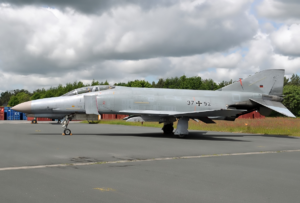Krastenfeld K4 Sturmvogel: Difference between revisions
(Created page with "{{WIP}} {|{{Infobox aircraft begin |name= Krastenfeld K4 ''Sturmvogel'' |image= Krastenfeld K4.png |caption= Preserved Englean K4-H7, 2015 }}{{Infobox aircraft type |typ...") |
No edit summary |
||
| Line 31: | Line 31: | ||
The K4 was retired by the Luftstreitkräfte in 1999, but remains in service with many nations within Sunalaya. | The K4 was retired by the Luftstreitkräfte in 1999, but remains in service with many nations within Sunalaya. | ||
==Operators== | |||
*{{flag|Englean Empire}} | |||
**{{flagicon|Engleberg|army}} [[Fliegertruppen des engleanisches Kaiserreiches|Englean Imperial Air Force]] | |||
**{{flagicon|Engleberg|naval}} [[Kaiserliche-Marine|Englean Imperial Navy]] | |||
Latest revision as of 22:30, 26 February 2020
This article is incomplete because it is pending further input from participants, or it is a work-in-progress by one author. Please comment on this article's talk page to share your input, comments and questions. Note: To contribute to this article, you may need to seek help from the author(s) of this page. |
| Krastenfeld K4 Sturmvogel | |
|---|---|

| |
| Preserved Englean K4-H7, 2015 | |
| Role | Interceptor, fighter-bomber |
| National origin | Englean Empire |
| Manufacturer | Krastenfeld Luftschiff- und Flugzeugbau |
| Designer | Erik Geberson |
| First flight | 1958 |
| Introduction | 1960 |
| Retired | 1999 (Englean Empire) |
| Status | In limited service |
| Primary users | Luftstreitkräfte (historically) Aruschan Republican Air Force |
| Produced | 1958-1983 |
| Number built | 5,875 |
The Krastenfeld K4 Sturmvogel is a tandem two-seat, twin-engine, all-weather, long-range supersonic jet interceptor and fighter-bomber originally developed for the Englean Luftstreitkräfte but later was exported and used by various air forces around the globe. The vehicle was a resiliant and effective aircraft, being adapted for multiple roles outside of its designated interceptor and fighter-bomber roles. With a top speed over mach 2.2, the K4 became the Luftstreitkräfte's primary air-superiority fighter through the majority of the Cold War.
The K4 was used within various wars during the period between 1960 and 1999, becoming a well-known aircraft in many militaries around the world. It was notable in Ventismar for its ability to act as a counterpart for the Libriran Pa-100 "Sickle" and as a deterrant for Libriran strategic bombers. The Luftstreitkräfte briefly armed the K4 with nuclear weapons from 1968 to 1978, when it was decided that the tactic of the deployment of tactical nuclear weapons was becoming obsolete.
The K4 was retired by the Luftstreitkräfte in 1999, but remains in service with many nations within Sunalaya.
Operators
Specifications
General characteristics
- Crew: 2
- Length: 63 ft 0 in (19.2 m)
- Wingspan: 38 ft 5 in (11.7 m)
- Height: 16 ft 5 in (5 m)
- Wing area: 530 sq ft (49.2 m2)
- Aspect ratio: 2.77
- Airfoil: ESA 345-20 root, ESA 345-23 tip
- Empty weight: 30,328 lb (13,757 kg)
- Gross weight: 41,500 lb (18,824 kg)
- Max takeoff weight: 61,795 lb (28,030 kg)
- Maximum landing weight: 36,831 lb (16,706 kg)
- Fuel capacity: 1,994 US gal (1,660 imp gal; 7,550 l) internal, 3,335 US gal (2,777 imp gal; 12,620 l) with 2x 370 US gal (310 imp gal; 1,400 l) external tanks on the outer wing hardpoints and either a 600 or 610 US gal (500 or 510 imp gal; 2,300 or 2,300 l) tank for the center-line station.
- Powerplant: 2 × Imperial Electric and Motor Works IEW-3984 after-burning turbojet engines, 11,905 lbf (52.96 kN) thrust each dry, 17,845 lbf (79.38 kN) with afterburner
Performance
- Maximum speed: 1,280 kn; 1,473 mph (2,370 km/h) at 40,000 ft (12,000 m)
- Maximum speed: Mach 2.25
- Cruise speed: 508 kn; 584 mph (940 km/h)
- Combat range: 367 nmi; 423 mi (680 km)
- Ferry range: 1,457 nmi; 1,677 mi (2,699 km)
- Service ceiling: 60,000 ft (18,000 m)
- Rate of climb: 41,300 ft/min (210 m/s)
- Lift-to-drag: 8.58
- Wing loading: 78 lb/sq ft (380 kg/m2)
- Thrust/weight: 0.86 at loaded weight, 0.58 at MTOW
- Takeoff roll: 4,490 ft (1,370 m) at 53,814 lb (24,410 kg)
- Landing roll: 3,680 ft (1,120 m) at 36,831 lb (16,706 kg)
Armament
- 20 mm (0.787 in) Maschinenkanone MK-392 located internally under the nose, 640 rounds; 2 x Maschinenkanone MK-392 gunpods on wings, 1 x MK-392 pod internally
- Up to 18,650 lb (8,480 kg) of weapons on nine external hardpoints, including general-purpose bombs, cluster bombs, TV- and laser-guided bombs, rocket pods, air-to-ground missiles, anti-ship missiles, gun pods, and nuclear weapons. Reconnaissance, targeting, electronic countermeasures and baggage pods, and external fuel tanks may also be carried.
- 4× LFK-935 Falkes on wing pylons
- 4× MLFK-387 Sperling in fuselage recesses
- 6× LBR-98 "Stuker"
- 4× SB-34 Standardbombe
- 4× LBR(R)-23 HAM
- 4× SB-234 Standardbombe
- 18× SB-156, SB-385
- 5× SB-925
- 18× VB-349 cluster bomb
- Nuclear weapons, including the Typ 59 nuclear bomb, NB-349 nuclear bomb, Typ 875 and TNB-94
